CANDID AND CONVIVIAL TAN FRANCE ON IDENTITY, STARDOM, AND BEING TRUE TO ONESELF
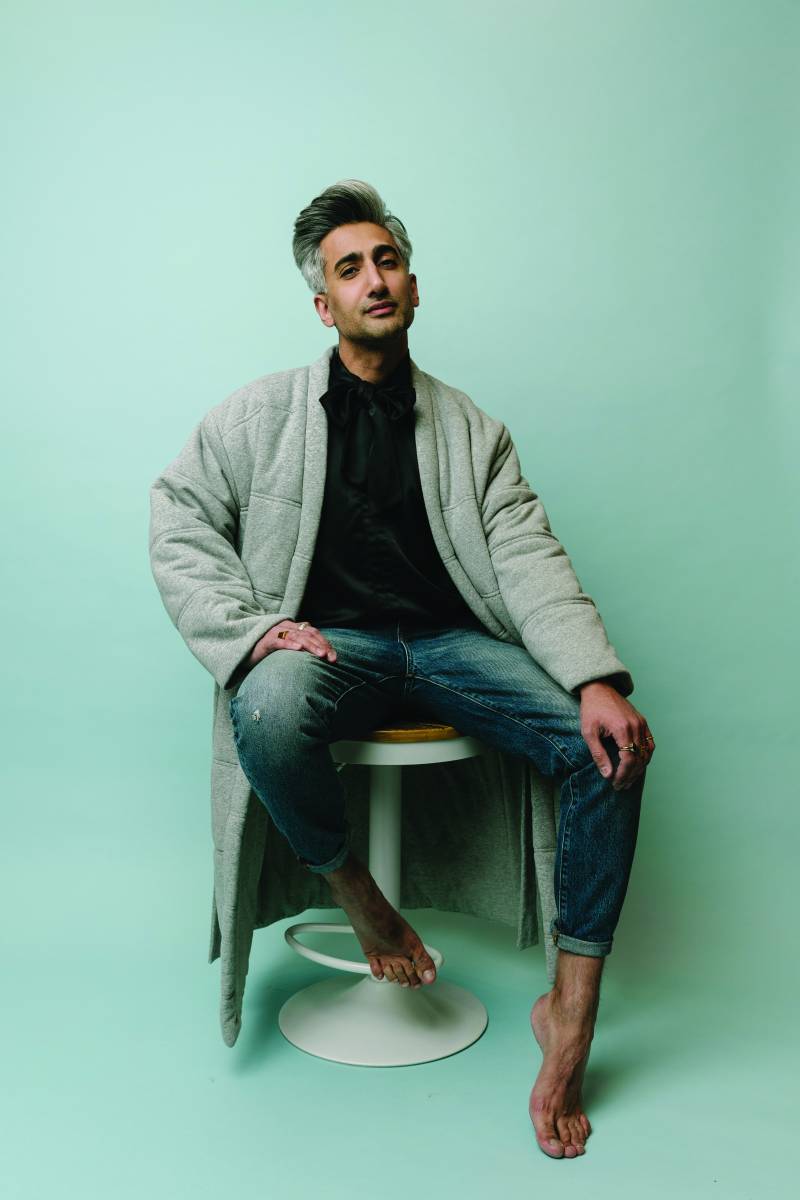
‘We watched quite a lot of Asian shows like Pakistani dramas–the majority were Pakistani or Bollywood. I wanted to be a Bollywood star when I was a kid’
Best known as the sassy stylist and fashion expert on Netflix’s Queer Eye and Next in Fashion – Tan France is much more than meets the eye. From a desi childhood in small town England, to a star on American TV, we talk to Tan about his journey, his roots, and the double-edged sword of representation in the world of showbiz. Its 9pm in Salt Lake City, as Tan France sits down to talk to H! Pakistan via zoom, in true Covid-era style. Comfy and relaxed in his matching Tartan PJs, it feels like meeting a long-lost cousin, as Tan immediately begins reminiscing about his last visit to Pakistan, and the perils of aunties and uncles.
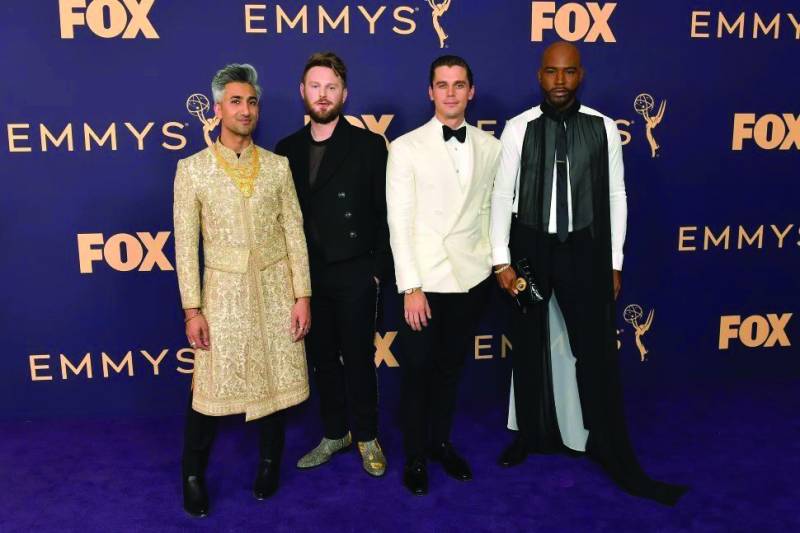
GROWING UP TAN
Born in a small town in South Yorkshire in England to a Pakistani father, and a half Indian- half Pakistani mother, Tan grew up in a close-knit Pakistani community.
‘It felt like we were one big family–everyone knew everyone else’s names, we knew who their children were going to marry, there were Rishta’s arranged within those families – it was like a big family within the Pakistani community in England’ ‘All we ever ate in my family was our own food – my mom would make ‘English’ food once every couple of weeks – which wasn’t English food – it was like pizza, or whatever she could find that ‘goray’ were eating. But mostly it was just our own food. (Laughs) ‘I was raised in a house which I don’t think was a strict Muslim household but compared to gorayit was. Compared to others in our culture, it wasn’t. We were allowed to watch English TV; we were allowed to listen to English and American music – we were quite free – but – we watched quite a lot of Asian shows like Pakistani dramas–the majority were Pakistani or Bollywood. I wanted to be a Bollywood star when I was a kid.' ‘Although we were very westernised outside the house, it was Pakistan – without a doubt.’ ‘We weren’t allowed to hang out with people outside of school. Everything was done within the Pakistani community’
Urdu and Language…
‘Our parents tried as much as possible to speak Urdu and Punjabi at the house –I speak Urdu and Hindi okay, it's just my accent is terrible – I sound very English when I speak’
When we asked about Urdu slang,Tan says
‘I don’t know slang! Mera lehja to kafi fazool hai, is liye me bolta nahin hoon – I know swearwords, which is terrible (laughs) – but I think that’s how all kids learn a language. But actually, my first language is Urdu – my third language is English’ ‘Actually, my mom’s family only speaks Punjabi, my dad’s family only speaks Potohari! A happy medium – because they spoke different languages, they tried to speak Urdu together so we could learn. They said that Urdu is the most beautiful language – to be quite honest, Punjabi and Potohari I think just sound rough, whereas Urdu sounds beautiful – so they wanted to teach us a language that people would understand, and that sounded nice’
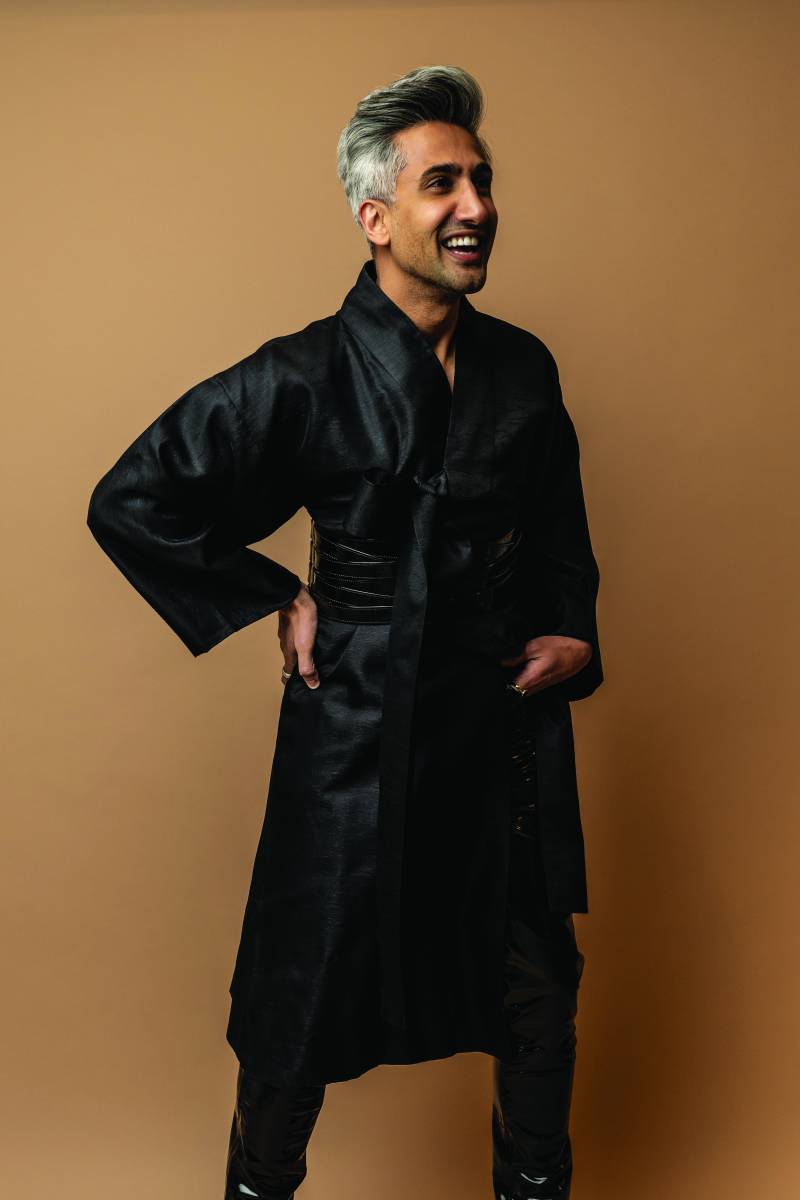
FASHIONABLE BEGINNINGS
‘My granddad came over to the UK and opened a factory that made denim garments. I used to watch that thinking that it’s strange that a man does this – I haven’t seen that from anybody else in the Pakistani community.
I was also fascinated thinking I can get to create a version of myself every day if I want to from a piece of fabric. So, I got a firsthand experience of where my clothes come from, and what you can do with that clothing to make yourself feel the way you want to feel.
And so I learned how to sew, I’d make clothes at home, my mom had a big industrial sewing machine that she got from my granddad–and I used to use that when I was nine or 10 – I would make my sisters clothes, and also altered all of my own clothes – so fashion was always going to be where I ended up – it was in my genes.
'But it wasn’t quite that easy… ‘Don’t get me wrong, my parents definitely didn’t want me to do that, they didn’t think it was the job for a boy. It was fine for my granddad to own a factory, where women worked on the sewing–it wasn’t OK for their son to do that–they wanted their son to be a doctor or a lawyer. I wasn’t interested in that at all. All I wanted was to make women feel beautiful. And so, I signed up for Fashion College and that’s how I started.
TAN IN PAKISTAN
‘My favourite memory is my last trip, about 14 years ago, when I went to Rawalpindi to design my sister-in-law’s wedding lehnga. My brother was getting married, and our family was to provide the clothes - so I was a designer, and I said I want to design it, but I want to go to Pakistan to make it.’
‘So, I went with my mom, and we stayed in Rawalpindi with my brother’s wife’s family who also came with us (I’m really close with my sister-in-laws) and I had probably one of the best vacations of my life. I helped cook every day – and my sister in- laws mom, who has never been to England–found it so strange that this boy from England wanted to make gobhi and bhindi every morning with her - and I would teach her to make it my way! She was just so confused that this boy was cooking!’ (Laughs)
‘It was one of my favourite trips, I loved it so much! The rest of the time I would do whatever I wanted, I could go and explore, I went to a zoo, a theme park in Islamabad – so it felt like the most fun trip there.’
The many places Tan would like to visit…
‘I would want to go to Pindi again. Also, Lahore, I last went when I was 12, and I liked the hustle and bustle of it. And this might sound weird, but I want to go back to Gujranwala – I liked that it was a village/city–I liked the culture a lot there, the people were so nice. And then, my family is from – oh God I can’t remember the name – Jijyala – a really small village, it’s only my extended family that lives there. I would go there – my dad and grandmother are buried there… So, I would want to go there.’
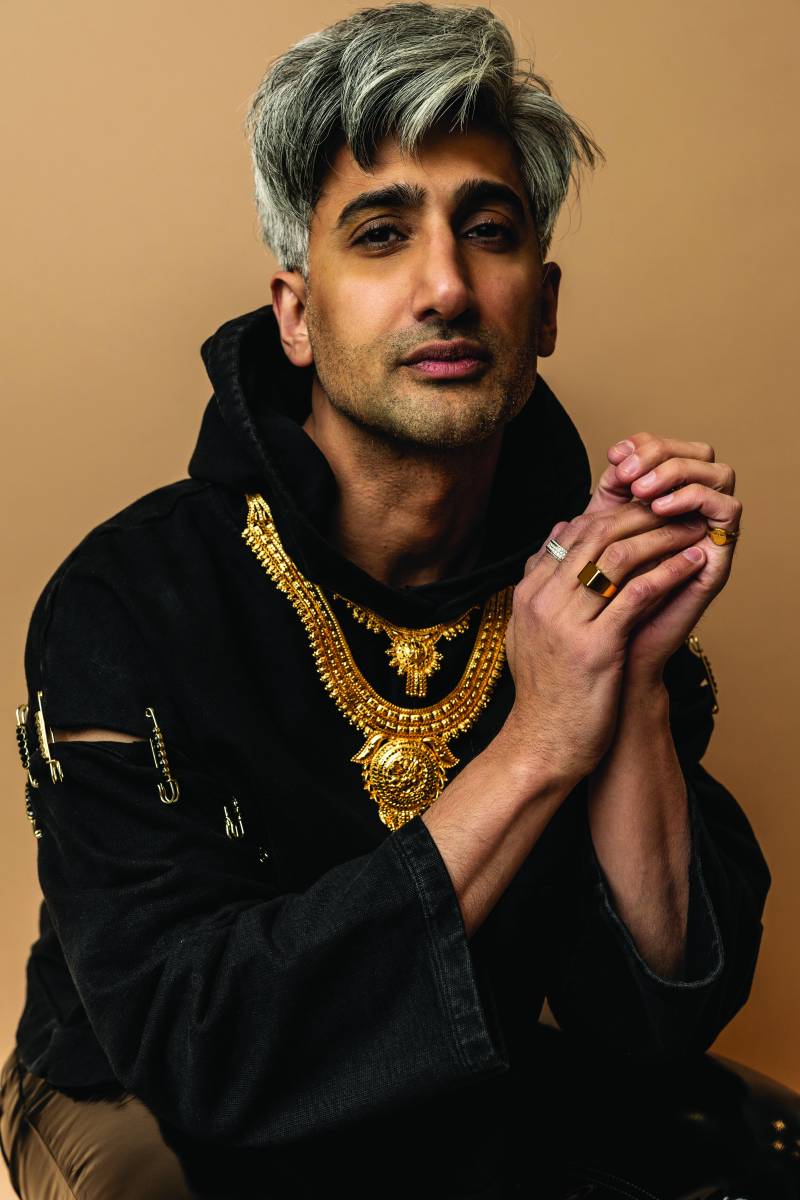
LGBTQ IN PAKISTAN
Tan has mentioned in the past that his only hesitation in revisiting his ancestral home lies in fears for safety, considering his visibility as a member of the LGBTQ community. Considering the increasingly vocal activism amongst rights groups in Pakistan, we ask if he feels things are changing.
‘It’s nowhere near where it needs to be, if I’m completely honest,’ he states, ‘however- neither is America, one of the most developed nations on the planet. Violence against LGBTQ people still happens very regularly–Unless you are in the major cities like LA, New York, Chicago–but we still suffer abuses in the real heart of America. That’s why we’re doing a show like Queer Eye–to show us as real people, regular people. And Pakistan is in a similar boat, where there may be a little more acceptance in the big cities but nowhere near the level of acceptance that needs to be offered.’
The comments he gets through social media are a start indication of this divide:
‘The amount of DMs I get through the likes of Instagram–both good and bad–where the Pakistani community is saying we don’t have gay people here – well that is ridiculous. And the other community – the gay community and the ally community – say we need people that show that we exist, that we are not alone, we are not monsters and we deserve love and kindness. The fact that I get those DMs so regularly, makes it clear that things aren’t where they need to be in Pakistan’.
‘That’s why people like me are so important in entertainment–the term ‘representation matters’ has been said many times–it's so true. If I had people like me on TV – I wouldn’t have felt like a freak, I wouldn’t have felt alone as a child. I think it comes from the top, so laws need to be changed from the top.’
THE RELUCTANT STAR
Moving on to Queer Eye; we must admit to letting out a cheer when we saw a Pakistani face amongst the Fab Five! We ask Tan how it all began.
‘It’s a very unique strange story. All my cast members had auditioned for shows for many, many years; they all wanted to be in entertainment. However, I had just retired – I had sold all my businesses and MashAllah life was sweet, we were killing it! I thought we would never need to work again. I’m going to have children and I’m going to raise my family and we’re going to travel the world.’ ‘And literally five days after selling the business – we made a quick trip to Las Vegas to celebrate and whilst I was there I got a call from a friend of a friend in L.A. who is a manager in Hollywood and he manages people from reality shows. So he introduced himself asked me if I would be interested in being on a show called Queer Eye? – No thank you, I’m hanging up now. I’m on vacation with my husband. He called back 20 minutes later saying ‘Will you please just take this call?’ ‘No Thank you, please don’t call me again’ and then my friend called me and said ‘No, no! He’s serious. This is a real job!’. I was like ‘I’m not an entertainer and I have no interest in being in entertainment – Thank you very much’. Anyways, a couple of days later – I agreed to a call with Netflix.’
‘Somebody in Netflix had seen my Instagram – so I have a personal and a business Instagram – and on my business Instagram I would talk about the latest products or fashion every week. When I sold my businesses, I uploaded a Goodbye message on my Instagram thanking everyone for their support and love. So that person at Netflix saw this and told Netflix that ‘If we’re looking for this one fashion guy, we’re struggling to find him – I know somebody from Instagram – He’s loud, he’s playful, he’s funny and he always says whatever comes to his mind – Like nobody can shut him up. We should audition him.’ And that’s how they found me – through my stupid videos talking about clothes.’
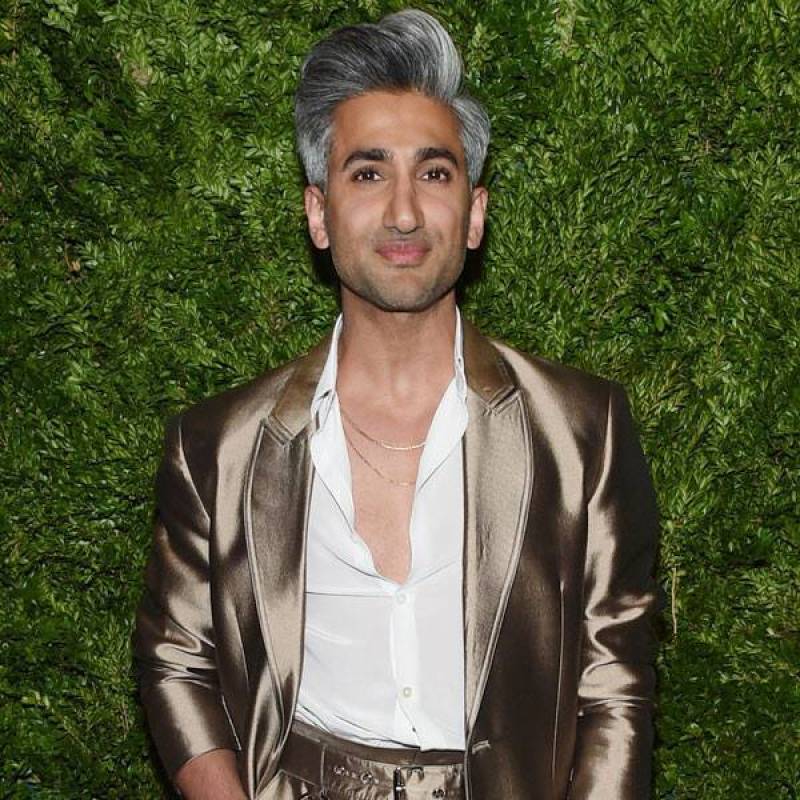
What was it like auditioning?
So, they (Netflix) asked me to do a live audition for them – it was 3 days long. And it was very clear to me by the second day that they wanted me, and it was very clear to them that I didn’t want the job. So, I was just having fun, talking to everyone – They were quite confused by my calmness.
So, after three days I went back home thinking – they may offer me a job and if they do, I’ll turn them down. Five days later they did, and I accepted it immediately; but I called back the next day saying no thank you, I don’t want the job. I’m not an entertainer. I just wanted to make friends. They eventually convinced me to take the job and I did. But I tried to quit every week for 3 weeks after I started. And then finally, on episode 3 they told me to stop quitting. You’re great.
But why did you want leave?
‘Actually, there is an honest reason behind it. In episode 2, I didn’t think I was doing a very good job. I don’t know how to be ‘American’ and the show is very ‘American’. Like the boys are very loud – I love them all - and they all know how to do entertainment – And I was just Tan – I talk the way I normally talk, I was the way I normally am and I don’t know how to put on a different personality for the camera. I worried that I wasn’t doing very well.’
‘And then the second reason was that I was very scared – and honestly that was the biggest reason. I was scared of how the Pakistani Community would respond, how the Muslim Community would respond, and I was really scared of the pressure – of what people would expect of me. Because I’m not perfect – there is so much stupid stuff that I do that is not wise and I don’t want kids following everything I do. So that pressure was intense. Which is why I thought that if was a big show then I did not want to be a star – I just wanted to go far away and be unknown on the street. But now I feel differently and can take the responsibility confidently.’
‘And so, at 11p.m, I went to see the executive producer – knocked on his door – saying ‘My flight leaves in 8 hours. I’m here to say goodbye’. However, he convinced me to stay. And the Main thing he said was ‘I’ll never understand the pressure you’re under; however, we will have people to support you. And as far as you on the show are concerned, we hired you because you’re not American, because you don’t know how to do that. We hired you because people at home will think that we understand him at least – He’s just like us’.
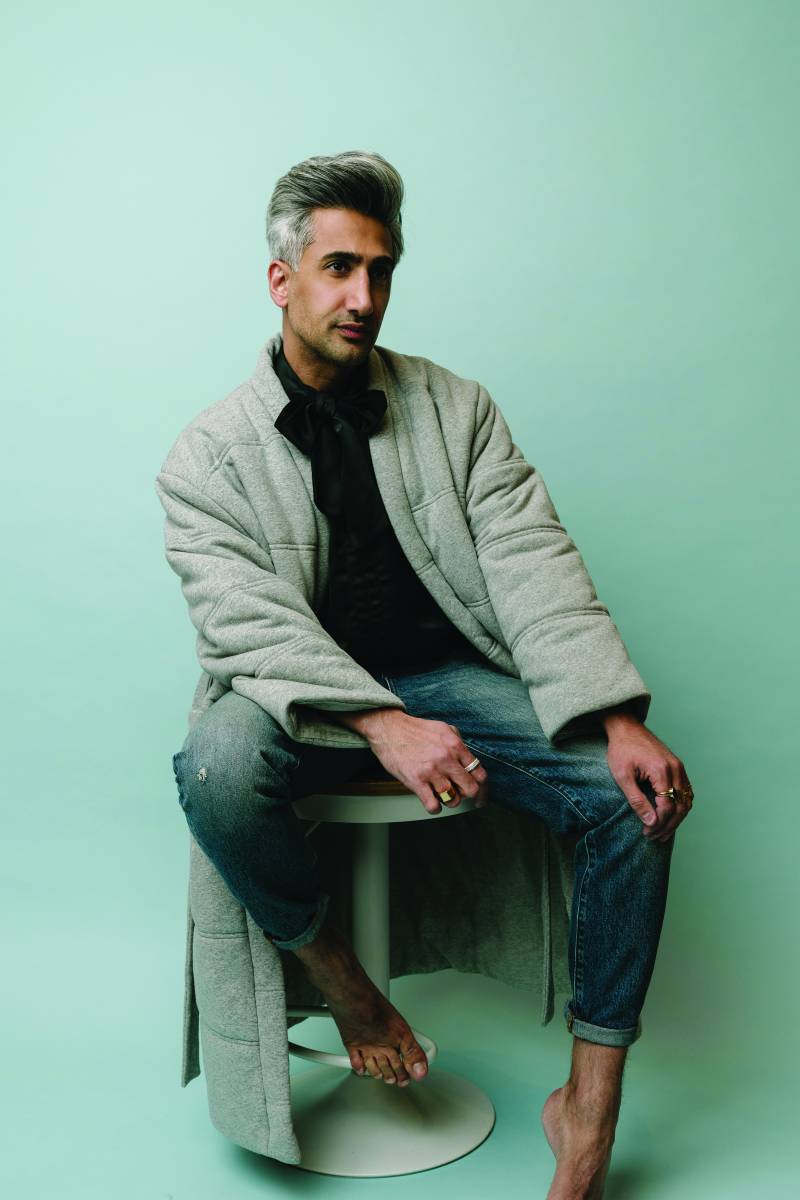
Do you feel that you faced any disadvantages or prejudice due to your background?
‘Yes, absolutely! I recounted an experience in my book, which kind of changed who I wanted to be in this industry. I just wanted to be myself, do my job, knuckle down, get Queer Eye done, be quiet, and then never do show business again. I enjoyed it, but this was never meant to be my life. I was a designer; I was never meant to be an entertainer.
And then this one person said something to me about a year and a half ago. It was a party during the Emmy season. We had just won a bunch of awards, and one of them was Best Reality Show. That same night, a very high-level executive in Hollywood, who is a big Queer Eye fan, and a fan of mine - I thought that I knew this person quite well - got a little drunk and said ‘you need to change a little bit of your personality.’ I go ‘oh really, I think I’m doing fine’ and he said ‘I just think you need to not try and be sexy’ and I was like ‘what do you mean’ and he said ‘I saw something that you posted that was a little too sexy.’ (I had shown some skin – I don’t show my body generally, I just had my shoulders showing.)
He says ‘leave that to the white guys or to Karamo – you’ve finally been allowed a spot on TV where you get to show the nice side of South Asians – you’re not a terrorist on a TV show, you’re not a doctor on a TV show, you’re not a taxi-driver on a TV show, you get to be a real person – that should be enough, calm down, take your time’
I was like, ‘you never get to talk to me like that, like ever again – I get to be a complete person just like everybody else – if I want to be sexy, I’ll be sexy, if I want to be sweet, I’ll be sweet, I will be a whole person, just like everybody else in Hollywood gets to be. Just because we’ve never seen that before from a South Asian doesn’t mean that that’s going to be impossible for me.
‘The bigger the show got, the more pressure I got from my own community, to be perfect, to not bring shame onto the community. To not embarrass Pakistan’ 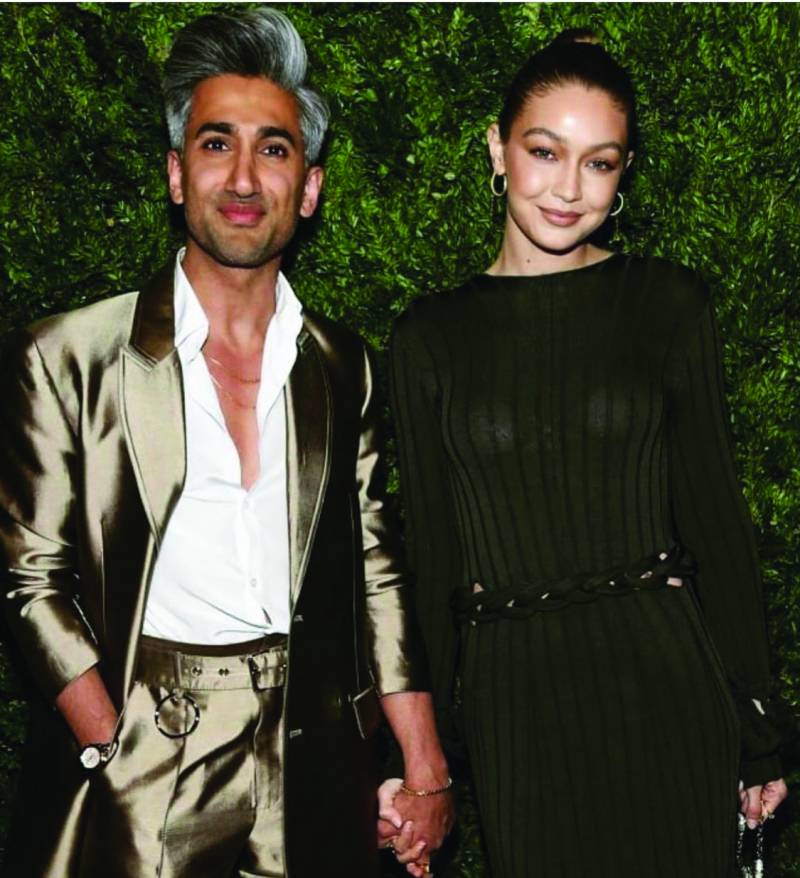
And that brings us to a cause that is close to Tan’s heart
‘That changed my attitude, so I created this account on Instagram called Shaded – we’ve stopped for a while, the last few months because we are about to do a documentary about it, so we are being very strategic about what we post but the idea that just because somebody has a different skin colour means that they’re not attractive or that they’re not allowed to be seen as desirable … and just because I’m Pakistani doesn’t mean that I’m either the geek, or the guy who has to be nice, I get to be cool, sexy, fashionable – I get to be just like everybody else in Hollywood, and nobody gets to tell me I don’t.’
REPRESENTATION MATTERS
Speaking of pre-defined roles for South-Asians – there are so few desi faces on American TV… ‘You know, you are so right, there are so few of us. I did a count recently – the funny thing is we’re all friends. So me, Mindy Kaling, Hasan Minhaj, Jameela Jamil, Kumail Nanjiani, we are all friends which is very sweet, but we make fun of how few of us are out there – there are like 10 of us in the whole entertainment industry where there are tens of thousands of white entertainers.
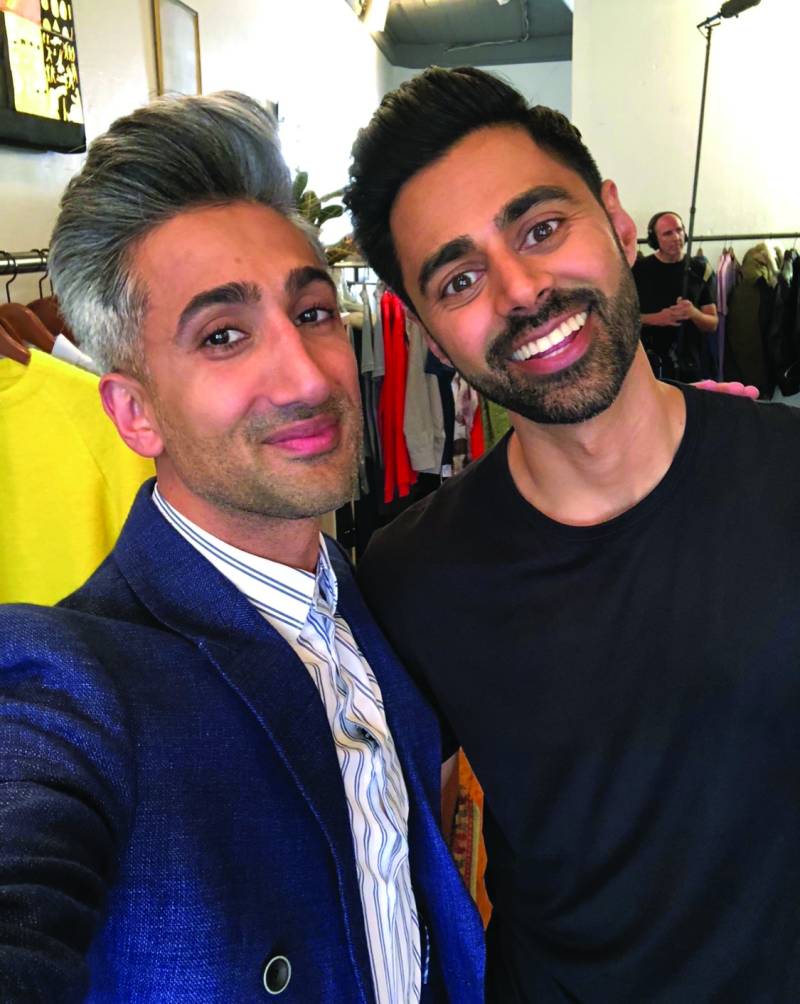
‘If I had to style someone in desi attire it would be Gigi Hadid – she once wore a lovely shalwar kameez on eid... I would probably put her in a beautiful lehnga - I love a classic lehnga’
How do you feel about taking on the burden of representation?
‘I think the pressure on me is a little different – I am the only member of the LGBTQ community, who is also South Asian and very open about the fact that I am Muslim also. And so, I’m a few things in America – I’m an immigrant, I’m Muslim, I’m South Asian and I’m gay – and there hasn’t been anybody like that on TV in the US before, or entertainment in general, so the pressure is really really great. It’s the hardest part of this job without a doubt.
‘I’m sure you can imagine, when you are somebody who is a little different, a lot of Pakistanis don’t appreciate that. There still are a lot of small minded Pakistani people in and outside of Pakistan, who say ‘we don’t have gay people in our community’, and that’s the most difficult part, when there’s nobody else to help you balance it out. When there’s only one person to focus your anger on, you are responsible to make sure you are the ‘perfect’ version of that. That pressure is a lot.’
‘The first year of Queer Eye was very difficult though I’m very grateful for its success. Being on such a massive international show may be lovely for my white cast mates, because they just get to enjoy the joy of being famous and successful and wealthy and all those things. Whereas for me the bigger the show got, the more pressure I got from my own community, to be perfect, to not bring shame onto the community. To not embarrass Pakistan. And that’s not easy, and it doesn’t get any easier.’ ‘The pressure I feel is less because I’ve stopped giving a sh*t, quite honestly, what ‘Uncle Bilal’ thinks of me – but – the bigger my star gets, the more pressure is put on me.’
BRINGING DESI BACK (IN FASHION) Speaking of representation, Tan rocked a sherwani at the Emmy’s. We ask him his thoughts on South- Asian fashion and incorporating desi culture into his style?
I have grand plans! If the Emmy’s were to have happened this last September, I had something so mega planned…
‘I was excluded from every best dressed list because I was wearing something that people didn’t understand – whereas in my opinion it was just beautiful’
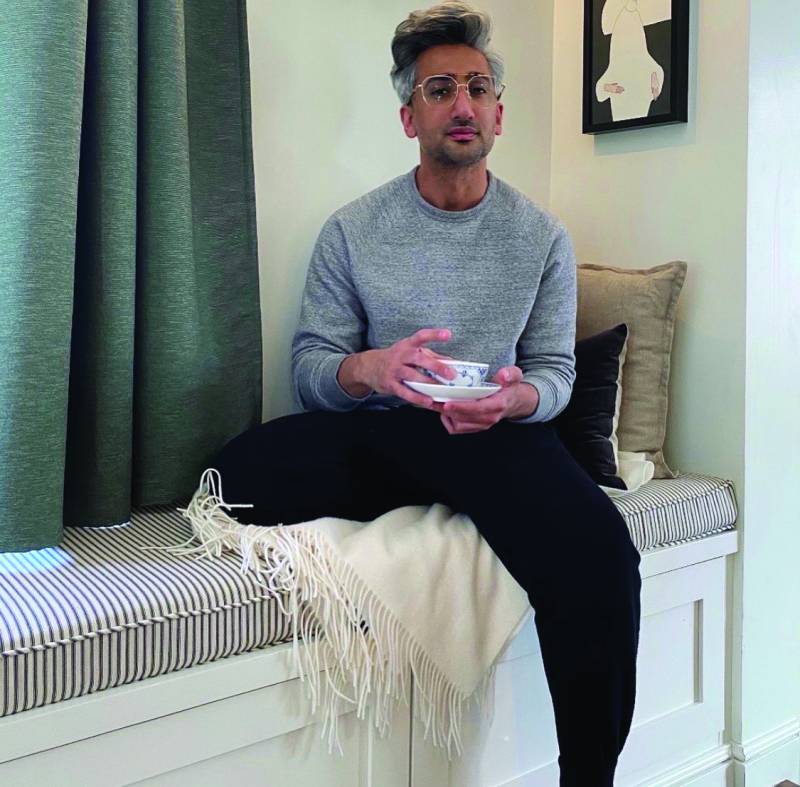
Can you tell us?
‘I can’t! Because I’m going to do it next time! But I am welcome to wearing South Asian clothes, I have some great things coming up. – I’m used to wearing South Asian clothes – at home I was only allowed to wear shalwar kameez – my mom would tell me off if I wore jeans because we weren’t allowed to wear English clothes at home, and even now she doesn’t like it if I wear jeans in front of my elders because I’m showing too much of my shape!’
On Pakistani Designers...
I will say this – from what I’ve noticed, Pakistani designers aren’t that great with social media – whereas Indian designers are great with social media. So, I got so much flack when I wore Indian designers at the Emmys saying ‘why aren’t you wearing Pakistani designers. We know you’re south Asian but you’re actually Pakistani’ – I don’t know any Pakistani great designers – they don’t have great social media accounts – so it makes it really hard.
On the response to the Sherwani in the west
Actually, I will make this comment, because it really bugged me – in the west, nobody was interested in what I wore because they were too concerned about a black tux that every man was wearing - so boring. Normally I don’t care if I’m in a best dressed list – I get it, people have very different preferences as to what they like – but I think that I was excluded from every best dressed list because I was wearing something that people didn’t understand – whereas in my opinion it was just beautiful, I don’t care what culture it comes from – if it's beautiful its beautiful.’
If you had to style someone in Desi-attire – who would it be, and what would you envision for them?
‘Well I’m going to say this person just because she’s a good friend and I’ve seen her in Desi clothes before – Gigi Hadid – she once wore a lovely shalwar kameez on Eid. I don’t really know modern women’s Pakistani trends anymore – but I would probably put her in a beautiful lehnga– I love a classic lehnga. I don’t care that the kids aren’t wearing them anymore – they are gorgeous, so beautiful.
If they ended up getting married, can you imagine if one of their wedding events was desi style – I would love to see Zayn in a sherwani, he’s so handsome. He would look great in a sherwani.’
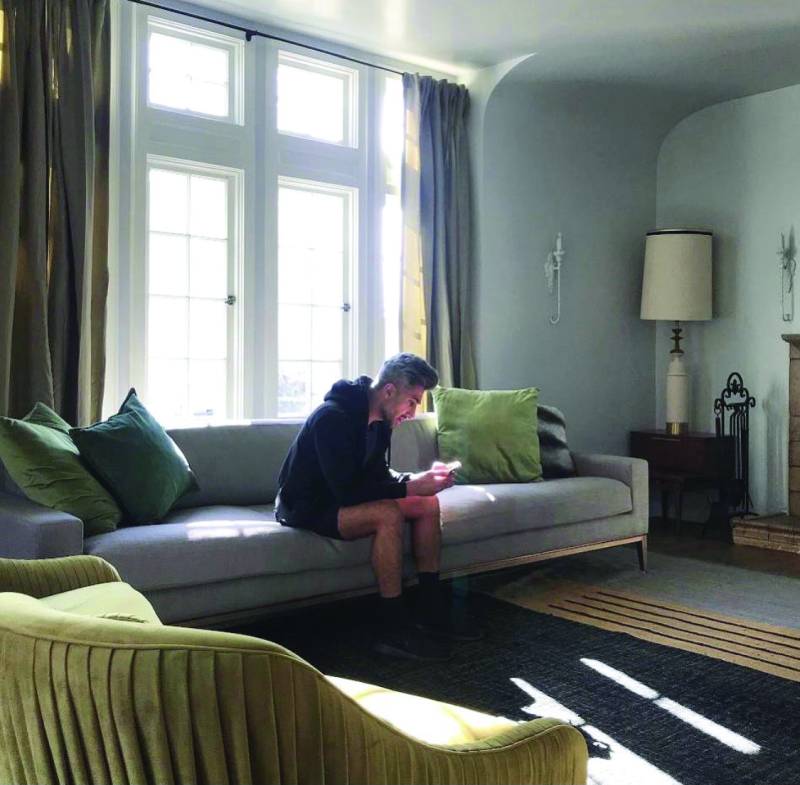
ON A LIGHTER NOTE... Who is your Favorite amongst the Fab 5? Is that even possible to pick one?
(Laughs) Well, obviously this is a lie – I don’t have a favorite. But I will say this, we’re all very close. And I think we do a beautiful job at work. However, Bobby, Karamo and Jonathan live a slightly different life. They all drink and go out to bars. I don’t drink alcohol and Antoni doesn’t either. So, we have a very similar social life; and that’s why we became very, very close. We are very similar people, like, we are always done with our dinner and tea by 10pm and then we go to our apartments to sleep. We’re kind of like granddads – we are the ones that don’t party.
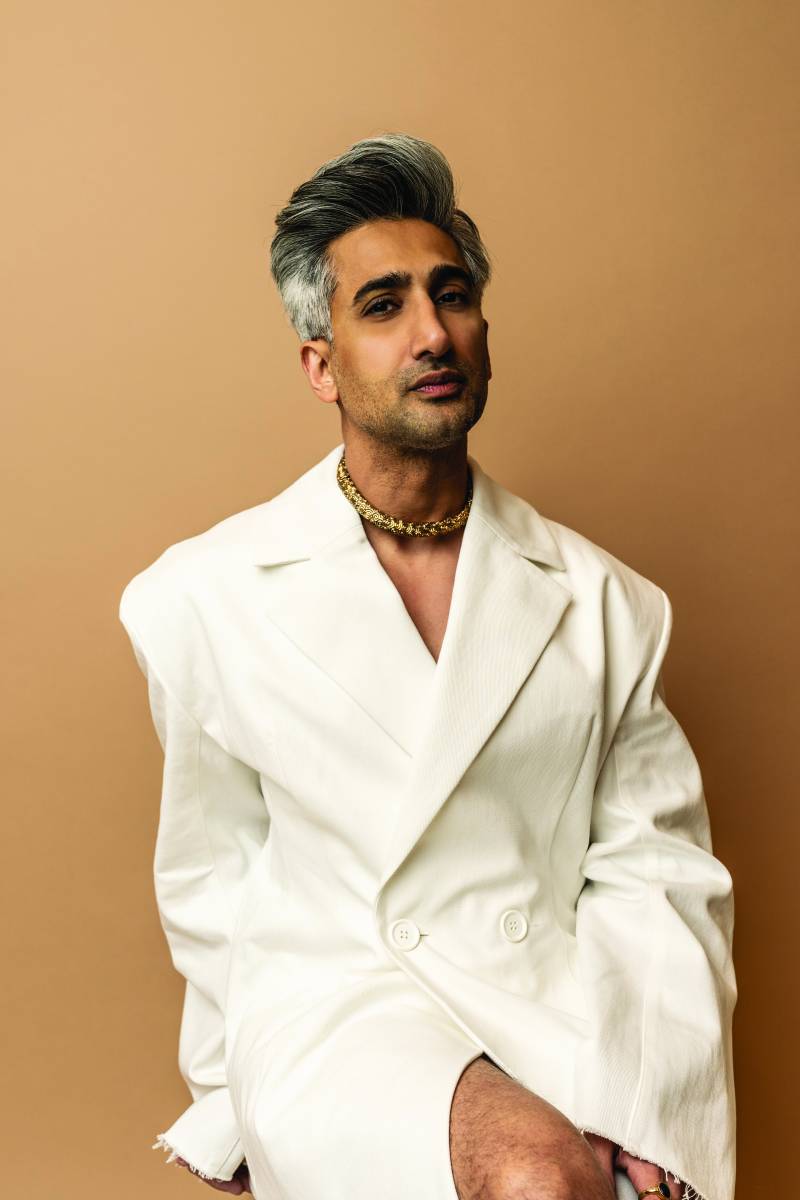
We’ve seen you make daal, roti and all that – Have you taught Antoni a thing or two about desi cuisine?
‘I take Antoni for Pakistani food all the time. When we’re shooting for Queer Eye, we see each other every day; however, when we aren’t shooting, we see each other for one week – when I’m travelling to New York – a month. So – at least 2-3 nights a week we go for Pakistani food.’
‘I don’t cook inside the apartment when we’re shooting cause the smell is intense. And my mum always taught me ‘If you’re going to make Pakistani food don’t do it unless you actually love it, otherwise you can tell it’s a bad meal’ And so it takes me at least 2 hours to cook! I don’t usually have that much time to cook for him – My spices, my tawa and pans are all at home. But I have taught him how to make some things like daal– which is super easy. He made chicken tikka – which I taught him how to marinade.
Ever since COVID, I’ve been home, so I have been cooking 3-4 times a week and trying different things. Recently, I made aloo chanaywhich I loved. But usually I love eating gobhi, rajma, bhindi (Always) and daal. I also make goshtsometimes but mostly I like vegetables.
I always tell everyone – My mother raised a Bahu. The thing was my sister used to call herself a feminist – she isn’t one anymore – She’s such a ‘Satti-Sawatri’ now, a good housewife; however, when we were kids, she used to be like ‘Just because I’m your daughter doesn’t mean I’ll cook. I’m going to university; I’m going to get a job and I won’t be a stay at home wife’. She’s all of those things now. However, my mum was like well somebody has to learn and so from a very young age it was obvious that I wanted to learn how to cook. And so, she taught me how to cook. And when I was 13 years old – My father passed away – and I had to cook for all the family – poora khandaan– Like make BIG patilas of biryani, qormaand 50 Rotis. I can cook for many people. I’m the bahu.
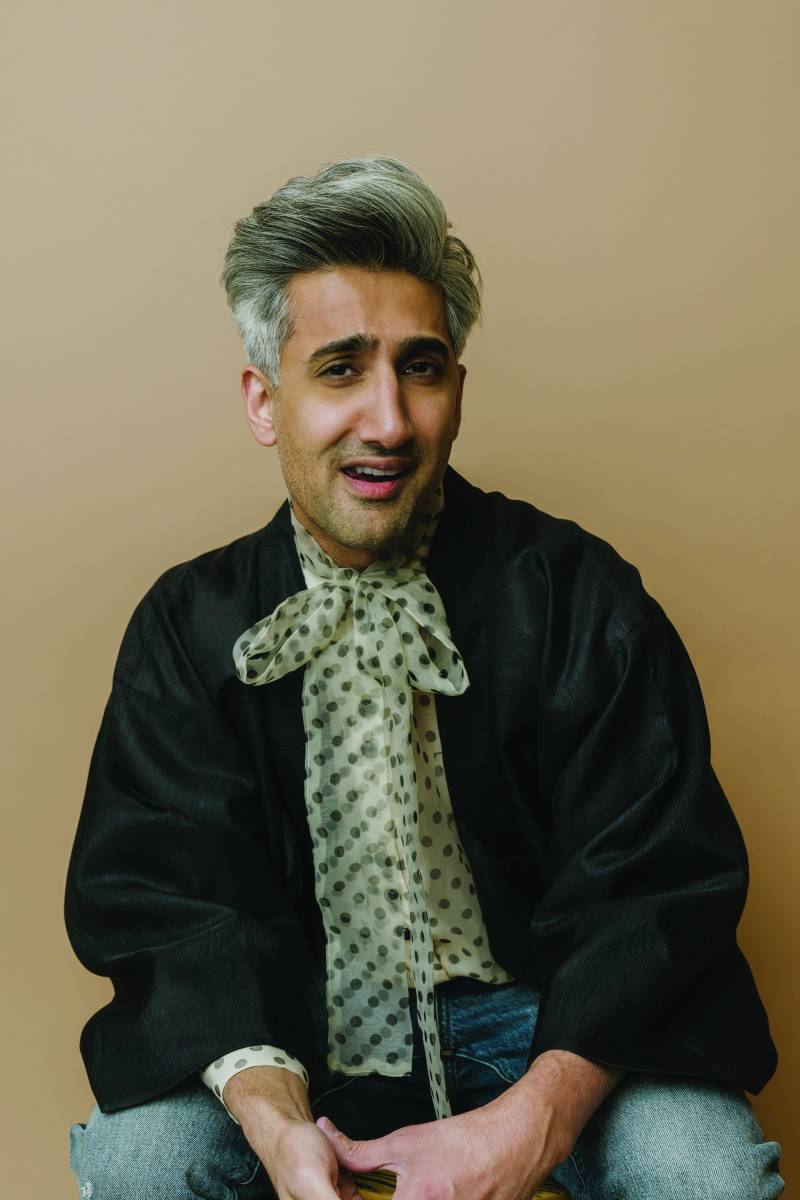
‘If I went as myself now, I would tell little Tan It’s going to get better – you’ll be able to live the life you want to live – you just need to be a little more forceful about what you want’
Are you coming out with a cookbook?
I want to! I don’t know if I can say this, but we are working on a show with a cooking element. Where I teach people how to make salan. It’s not guaranteed but we’re trying to work it out.
Any other projects… I’m doing a show called Dressing Funny. It’s like a 10-minute episode where I give makeovers to my favorite American comedians. The reason I love it so much is because on Queer Eye I’m quite edited; which makes me seem quite innocent, I guess. And I’m not. I swear all the time! And I’m vulgar too. So, on Dressing Funny I can do whatever I want and be silly and I get to dress up my favorite American Comedians.
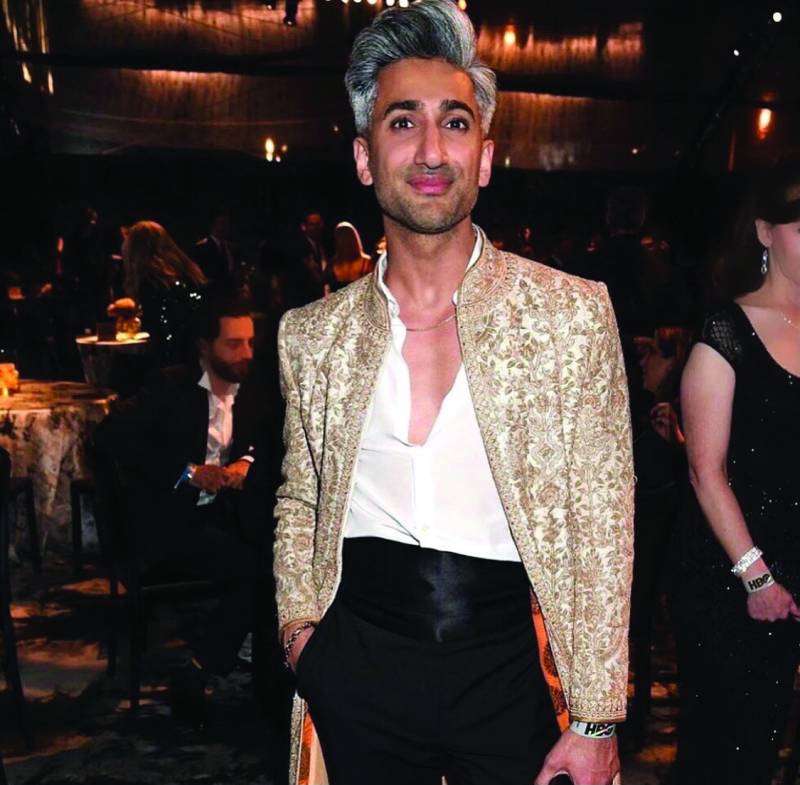
RAPID FIRE
We hear you might be a bit obsessed with scented candles – a favourite scent?
Baies or Berries by Diptyque Paris
We’ve seen you cook tarkha daal and roti – what is your ideal desi meal?
We start with samosas – the keema and mutter ones, then bhindi and then gajjar Ka halwa,
Biryani with aloo/biryani without aloo
Always with aloo, obviously!
Nihari or Karhai
Nihari
Favourite desi Attire?
For men I love the sherwani and sari’s for women
The trend to drop ASAP?
Street Wear. I’m just tired of ugly clothes…
What’s on your bucket list?
To re-visit Japan again – It’s fantastic!
Countries you wish to visit…
Iceland and Pakistan
A song that describes your current state of mind?
DuaLipa - Levitating.
Favourite Music - Any Pakistani artist you like?
Well – I love Nusrat Fateh Ali Khan (But he has passed away); and I’m Obsessed with a Korean Pop Group called Black Pink.
Your favourite Bollywood Movie?
DDLJ, Khoon Bhari Maang– With Rekha and Seeta Aur Geeta
What’s the best compliment you’ve ever received?
From Fans: That I’m exactly the same in real life as I am on reality TV.
One habit you wish you could break?
Nail Biting – I hate it but I can’t help myself. And I wish I could get over sugar but I'm obsessed.
In 2021 you’re looking forward to...
Being with friends and family again.
WHAT NEXT?
Tan is a Man of many Talents – Fashion, Styling, Food, Home Décor and he’s even written a book! What’s next?
‘Social Justice. By that what I mean is that I want to change the perception of Pakistani–Muslims on a greater level. If COVID-19 eases off in the coming months then I’ll be able to renew my work on two projects. It a show that’ll be for the western audiences the US and the UK - mostly, showing that we are not what they perceive us to be. They will show Pakistanis in the most beautiful light.’
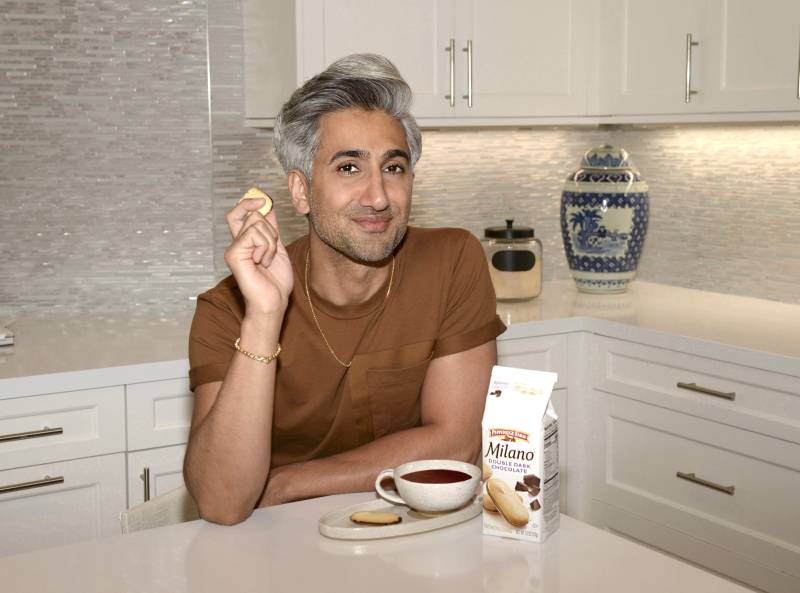
Looking back, if you could give advice to your teenage self, what would it be?
‘This might be too deep: To not put so much pressure on trying to convince my family that I’ll have an arranged marriage. I wish I had the strength to say, when I was younger, that I don’t want to waste anyone’s time by going through rishtay after rishtay after rishtay– it’s never going to happen, and I need you to understand that it isn’t going to happen, because I am happy with who I am. However when I was a teen it was the 90’s and it was really hard to be the person I am now – but – if I went as myself now, I would tell little Tan It’s going to get better – you’ll be able to live the life you want to live – you just need to be a little more forceful about what you want. And maybe don’t listen to everything your parents have to say – it’s wonderful to listen to your parents – but they’re not always right.’
INTERVIEW:SANA TARIQ HASSAN & SUNDUS UNSAR RAJA
SHOOT PHOTOS:PAIGE SOVIC
ADDITIONAL PHOTOS COURTESY:TAN FRANCE
- Tags: TAN FRANCE, Fashion, stardom, H! Pakistan,
